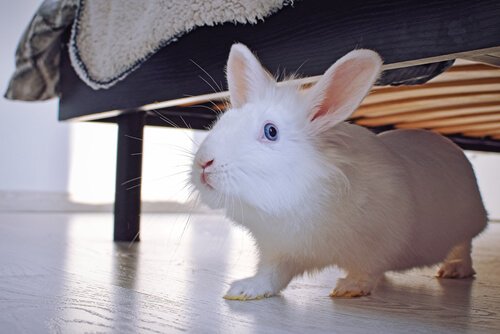Rabbits at Home: Hygiene Tips


Written and verified by the lawyer Francisco María García
Pet rabbits can bring a lot of happiness into your life, but they require responsibility. These small animals require attention in order to keep them healthy and the house clean. Therefore, here you can find the main tips for taking care of rabbits.
Rabbits at home: the positive side to having them as pets
Rabbits are an excellent choice for a pet, especially for children. They are gentle, active, and playful, and they can do several activities with children, because they are always willing to jump, explore and they don’t require a lot of space.
Just like cats and dogs, another positive aspect of pet rabbits is their interaction with owners. They give and ask for cuddles, enjoy human company, and like exercise.
Furthermore, rabbits are very intelligent creatures that are willing to learn. When they are encouraged, they can be trained like dogs. They can respond to calls, recognize commands, and even do different tricks.

Therefore, it’s a good idea to do some research on training techniques in order to motivate your rabbit’s learning. It’s an excellent way to bond with your pet and stimulate his body and mind.
Hygiene advice
Despite being independent creatures, rabbits require a lot of attention regarding their diet and hygiene. Below is a summary of the most important tips for keeping your pet healthy and the house clean.
-
Shedding
Rabbits shed four times a year. In order to get rid of dead hair, you need to brush them daily during shedding seasons. This rule applies to both short and long-haired rabbits.
Brushing them on a regular basis prevents possible allergies that are caused by hair building up in the house. This factor is of great importance for both the pet and owner.
-
Cutting nails
Rabbits have five nails on their front paws and four on their back paws that grow rather quickly. Rabbit nails don’t usually wear down naturally, so you’ll need to cut or file them frequently.
However, it’s not easy to cut a rabbit’s nails. The animal might get fidgety and even hurt themselves or another person. Therefore, if you don’t have any experience doing this, then it’s best to ask for professional help from a veterinarian.
-
Cleaning ears
Like cats and dogs, rabbits tend to accumulate wax in their ears. It is recommended to clean their ears on a weekly basis with clean gauze pad moistened in saline solution. You should be careful since rabbits’ skin is very sensitive.
-
Eyes
Eyes must be cleaned with gauze pas moistened in saline solution or sterilized water. If the eye crust turns a different color or it has mucous, it’s necessary to go to the veterinarian immediately.
-
Genitals
Many people don’t know how important it is to periodically clean a rabbits’ genitalia. Be careful when you clean them. Use a clean cloth moistened in saline solution. It’s best to do this at least once a week.
-
Teeth
Tooth wear is important for a rabbit’s health. There are several options for natural branches in the market. You should also give your rabbit hay because it helps prevent defects. The veterinarian can help choose the right one.

Can I bathe my rabbit?
This is a delicate matter. The truth is that a bath can be very stressful for a rabbit. It’s not considered necessary to give him a bath due to daily grooming. If the rabbit does get dirty, it’s recommended to clean them with a towel or clean cloth that’s moistened in sterile water.
Cage hygiene
Rabbits spend a large part of their life inside a cage or little house. That is their space, and therefore it’s important to choose and set one up properly. These animals are naturally very clean. So, cleaning the cage is one of the most important thing to assure proper hygiene. You should give it a deep cleaning and change the hay weekly.
Feces, as well as food and water, must be cleaned daily. This prevents the spread of microorganisms that are harmful to the animal and the home. Rabbits are fragile creatures and can have symptoms like loss of appetite, diarrhea, or changes in their coat.
Pet rabbits can bring a lot of happiness into your life, but they require responsibility. These small animals require attention in order to keep them healthy and the house clean. Therefore, here you can find the main tips for taking care of rabbits.
Rabbits at home: the positive side to having them as pets
Rabbits are an excellent choice for a pet, especially for children. They are gentle, active, and playful, and they can do several activities with children, because they are always willing to jump, explore and they don’t require a lot of space.
Just like cats and dogs, another positive aspect of pet rabbits is their interaction with owners. They give and ask for cuddles, enjoy human company, and like exercise.
Furthermore, rabbits are very intelligent creatures that are willing to learn. When they are encouraged, they can be trained like dogs. They can respond to calls, recognize commands, and even do different tricks.

Therefore, it’s a good idea to do some research on training techniques in order to motivate your rabbit’s learning. It’s an excellent way to bond with your pet and stimulate his body and mind.
Hygiene advice
Despite being independent creatures, rabbits require a lot of attention regarding their diet and hygiene. Below is a summary of the most important tips for keeping your pet healthy and the house clean.
-
Shedding
Rabbits shed four times a year. In order to get rid of dead hair, you need to brush them daily during shedding seasons. This rule applies to both short and long-haired rabbits.
Brushing them on a regular basis prevents possible allergies that are caused by hair building up in the house. This factor is of great importance for both the pet and owner.
-
Cutting nails
Rabbits have five nails on their front paws and four on their back paws that grow rather quickly. Rabbit nails don’t usually wear down naturally, so you’ll need to cut or file them frequently.
However, it’s not easy to cut a rabbit’s nails. The animal might get fidgety and even hurt themselves or another person. Therefore, if you don’t have any experience doing this, then it’s best to ask for professional help from a veterinarian.
-
Cleaning ears
Like cats and dogs, rabbits tend to accumulate wax in their ears. It is recommended to clean their ears on a weekly basis with clean gauze pad moistened in saline solution. You should be careful since rabbits’ skin is very sensitive.
-
Eyes
Eyes must be cleaned with gauze pas moistened in saline solution or sterilized water. If the eye crust turns a different color or it has mucous, it’s necessary to go to the veterinarian immediately.
-
Genitals
Many people don’t know how important it is to periodically clean a rabbits’ genitalia. Be careful when you clean them. Use a clean cloth moistened in saline solution. It’s best to do this at least once a week.
-
Teeth
Tooth wear is important for a rabbit’s health. There are several options for natural branches in the market. You should also give your rabbit hay because it helps prevent defects. The veterinarian can help choose the right one.

Can I bathe my rabbit?
This is a delicate matter. The truth is that a bath can be very stressful for a rabbit. It’s not considered necessary to give him a bath due to daily grooming. If the rabbit does get dirty, it’s recommended to clean them with a towel or clean cloth that’s moistened in sterile water.
Cage hygiene
Rabbits spend a large part of their life inside a cage or little house. That is their space, and therefore it’s important to choose and set one up properly. These animals are naturally very clean. So, cleaning the cage is one of the most important thing to assure proper hygiene. You should give it a deep cleaning and change the hay weekly.
Feces, as well as food and water, must be cleaned daily. This prevents the spread of microorganisms that are harmful to the animal and the home. Rabbits are fragile creatures and can have symptoms like loss of appetite, diarrhea, or changes in their coat.
This text is provided for informational purposes only and does not replace consultation with a professional. If in doubt, consult your specialist.








